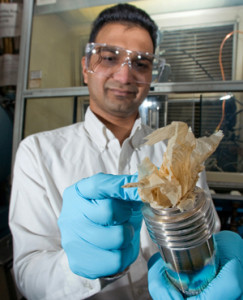The Electrochemical Society’s Vilas Pol has developed a new process to turn simple packing peanuts into energy-storing battery components.
Pol, an associate professor at Purdue University and active member of ECS, has thoroughly succeeded in turning one person’s trash into another person’s high-tech treasure. He and his team from Purdue University have developed a system that turns the puffy packing peanuts into nanoparticles and microsheets perfect for rechargeable batteries. Pol’s new generation of battery could even outperform the ones we currently use.



